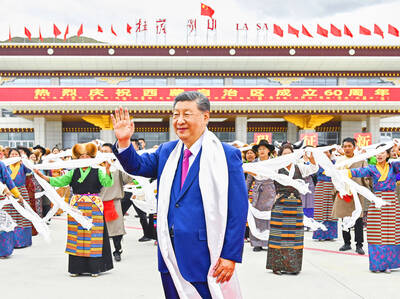An old woman with a Somali flag wrapped around her takes a swing at a member of parliament. Groups of men sit around playing cards or chewing narcotic khat leaves. A warlord with a shaved head, sunglasses and a foot-long grey beard tells the press peace is at hand.
It's just another day at the Somali peace talks.
One year after negotiations aimed at ending Somalia's civil war began amid great optimism, the talks have little tangible to show for the effort -- or for the price tag, estimated at more than US$2 million.
If Somalia's situation weren't so tragic, the ballooning list of delegates, disputes with hotel owners and fisticuffs that marred the early phase of the talks could have been considered comical.
But more fundamental is whether the federal system of government being cobbled together at the talks will bring peace to a country ripped to shreds by 12 years of anarchic conflict.
Twice the facilitators have announced "major breakthroughs" on an interim constitution and the composition of parliament only to be rebuffed by key faction leaders.
"This is the end of this conference," the president of the transitional government, Abdiqassim Salad Hassan, said when the facilitators announced a deal on the interim charter last month. "Whoever is behind this treachery has succeeded in scuttling the peace process. The talks have totally collapsed."
Abdiqassim has since stayed out of the talks along with several powerful faction leaders and even one of the three organizing countries, Djibouti.
The facilitators insist the conference is on track -- "alive and well" in the words of James Kiboi, liaison officer for the organizing body, the regional Inter-Governmental Authority on Development.
Thirteen previous formal sets of negotiations since the regime of dictator Siad Barre collapsed in 1991 failed to achieve a comprehensive agreement between the country's fractious militia leaders.
The current talks were hailed as Somalia's best -- and possibly last -- chance for peace when they began on Oct. 15 last year. Key international players were all on side, including the US, the European Union, the Arab League and Somalia's neighbors. All faction leaders were invited and agreed to participate.
Within two weeks, a ceasefire deal was agreed, tinging the talks with even more optimism.
Yet the unravelling was already under way. The organizers lost control of the delegate list, as faction leaders tried to flex their muscles by having larger and larger entourages. At one point, more than 800 delegates were registered -- all eating and sleeping on the international community's tab at around US$100 a day each.
The host hotel refused to serve food one day over unpaid bills. One faction leader got into a fist-fight with a civil society delegate and some of his supporters beat up another delegate with a lead pipe.
Walkouts began in January as faction leaders called for the resignation of the mediator, Elijah Mwangale. He was replaced in February by a former Kenyan ambassador, Bethuel Kiplagat just as the conference endured a chaotic move to a run-down college campus on the edge of Nairobi as a cost-savings measure.
Kiplagat promised more transparency and his personal energy and enthusiasm gave new life to the conference. He focused discussion on how to create a federal system, devolving power to the regions -- a way of simultaneously devolving power to the clans, which hold the allegiance of most Somalis.
Next Tuesday, the clans are scheduled to begin naming people to the 351-member parliament, which in turn would select an interim president with a four-year mandate.
Some of the participants organized an event on Tuesday to mark one year since the talks began. National songs accompanied by a synthesizer and patriotic poetry over a distorted loudspeaker were the order of the day.
Outside the tent where the delegates gathered, Nur Hajji Omar, a refugee and former militia fighter shook his head.
"This is a sad day, there's nothing to celebrate," he said. "One year later, they're still killing, they're still fighting. These people should be ashamed of themselves."

Ten cheetah cubs held in captivity since birth and destined for international wildlife trade markets have been rescued in Somaliland, a breakaway region of Somalia. They were all in stable condition despite all of them having been undernourished and limping due to being tied in captivity for months, said Laurie Marker, founder of the Cheetah Conservation Fund, which is caring for the cubs. One eight-month-old cub was unable to walk after been tied up for six months, while a five-month-old was “very malnourished [a bag of bones], with sores all over her body and full of botfly maggots which are under the

BRUSHED OFF: An ambassador to Australia previously said that Beijing does not see a reason to apologize for its naval exercises and military maneuvers in international areas China set off alarm bells in New Zealand when it dispatched powerful warships on unprecedented missions in the South Pacific without explanation, military documents showed. Beijing has spent years expanding its reach in the southern Pacific Ocean, courting island nations with new hospitals, freshly paved roads and generous offers of climate aid. However, these diplomatic efforts have increasingly been accompanied by more overt displays of military power. Three Chinese warships sailed the Tasman Sea between Australia and New Zealand in February, the first time such a task group had been sighted in those waters. “We have never seen vessels with this capability

A Japanese city would urge all smartphone users to limit screen time to two hours a day outside work or school under a proposed ordinance that includes no penalties. The limit — which would be recommended for all residents in Toyoake City — would not be binding and there would be no penalties incurred for higher usage, the draft ordinance showed. The proposal aims “to prevent excessive use of devices causing physical and mental health issues... including sleep problems,” Mayor Masafumi Koki said yesterday. The draft urges elementary-school students to avoid smartphones after 9pm, and junior-high students and older are advised not

Chinese President Xi Jinping (習近平) attended a grand ceremony in Lhasa yesterday during a rare visit to Tibet, where he urged “ethnic unity and religious harmony” in a region where China is accused of human rights abuses. The vast high-altitude area on the country’s western edge, established as an autonomous region in 1965 — six years after the 14th Dalai Lama fled into exile — was once a hotbed for protest against Chinese Communist Party rule. Rights groups accuse Beijing’s leaders of suppressing Tibetan culture and imposing massive surveillance, although authorities claim their policies have fostered stability and rapid economic development in